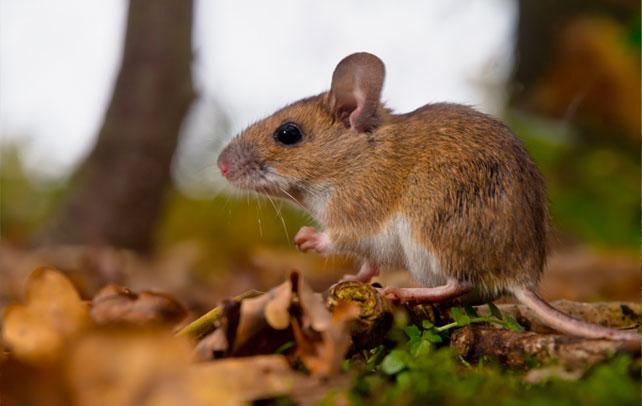Cool Facts About Mice

Mice have been associated and celebrated in the form of cartoon characters, like Mickey Mouse and Jerry that have almost become legends. With meek eyes and innocuous tiny body, a mouse looks absolutely adorable and totally harmless. But looks apart, they can wreak havoc in an infested house and even spread deadly diseases. Amazingly quick adapter in a given environment, the mouse is one of the most successful mammalians on earth. They belong to the order of rodents. The most widespread species of mouse is the common house mouse, also known as the Mus musculus. Agility, combined with sharp intelligence, makes it a very tricky animal to be trapped. Mice are loaded with those personality traits that make them excellent pets and companions for humans. Given below are few amazing facts about this little creature.
Fast Facts
Scientific Name: Mus musculus
Kingdom: Animalia
Phylum: Chordata
Class: Mammalia
Order: Rodentia
Superfamily: Muroidea
Family: Muridae
Subfamily: Murinae
Genus: Mus
Species: 30
Weight: 20 to 25 grams
Average Lifespan: 1 to 2 years
Diet: Anything
Habitat: In field, nest or burrow. They also live in homes and other buildings.
Age of Sexual Maturity: Males: 50 days, Females: 50 days
Gestation Period: 18 to 21 days
Number of Offspring: 3 to 12
Interesting And Fun Facts About Mice
- The tail of mouse is almost as long as its body.
- Mice are colorblind and do not tolerate daylight quite well; they are nocturnal creatures.
- Mice have keen sense of smell and hearing. Their hearing range is similar to that of humans, but they can also hear up to the ultrasonic range.
- While communicating with each other, they make regular as well as ultrasonic sounds.
- A mouse has two thymuses. One is about the size of a pea that is located in its chest while the smaller one, which is about the size of a pinhead, is located in the neck near the trachea.
- The chemical composition of the urine of male mice is very different from that of the female. The female urine lacks five compounds that are found in male urine.
- Newly born off-spring of mouse are blind at birth and lack fur on their bodies.
- Mice sleep for 12 hours a day.
- Mice need to continue eating almost all the time. They can chew through anything that is softer than their teeth.
- Mice are very particular about cleanliness. It has been observed in domesticated mice that they divide their cages into different sections for eating, sleeping, and defecating.
- Mice are scared of their larger cousins, rats as they are known to prey upon them. However, they have been known to coexist in the wild.
- Cats, birds of prey, snakes, wild dogs, foxes, and various other arthropods are their biggest predators.
- Mice are very intelligent creatures and are known to escape out of deep network of maze and solve complex puzzles.
- A mouse can jump to a height of whopping 18 inches in the air. They are very agile swimmers and climbers.
- The Greek God Apollo was often called as Apollo Smintheus meaning ‘Apollo the Mouse’; white mice were also put in Apollo’s temple under the altar.
- Ganesha, the Hindu God, rides on a mouse.
- In ancient Egypt cooked mouse were used to heal a number of ailments, including stomachaches.
- Old Jewish folklore proscribed eating of any mouse-chewed food as it was believed to cause memory loss and sore throat.
- Many people believe that fried mice or mice pie could cure bedwetting!
- Mice were domesticated as pets for hundreds of years
- The National Mouse Club of Britain was formed in 1895.
- In US alone, rodents cause extensive damage to property and farms annually.
- Some mice pretend to be dead when they are unable to escape or are simply frightened.
- Mice have a soft corner and they even nurture babies that are not their own.
- A mouse would seldom wander at a distance of 20 feet or more from its nest.
- Male mice are known as buck while does is the name given to females, and a collection of mice is known as mischief.
- Mice love to munch on hard bread.
- A mouse would curl up when it is being carried.
- The incisors of mice lack roots.
- The name mouse comes from a Sanskrit word musha that means thief in English.
- When kept on a table without a cage, a mouse will not dare to jump due to the fear of dropping off.
- Mice are able to produce their own Vitamin C.
- A female mouse can give birth at the age of two months old and can have 6-10 babies a year.
- In captivity, mice can survive up to 2 years whereas in the wild they can survive till 5 months, owing to the threats posed by their predators
- House mouse like other rodents, do not vomit.
- Mice have long sensitive whiskers near their nose. They use these whiskers as tactile sensors to navigate in the dark while traveling.
- Mice have a great sense of balance, allowing them to walk on thin cables, ropes, and similar thin objects.
- A mouse can pass on salmonellosis (bacterial food poisoning) by contaminating food with its feces.
- In North America breathing air that has come in contact with mouse excrement has been linked to Hantavirus which leads to Hantavirus Pulmonary Syndrome (HPS).
- Mice and rats are extensively used as animals for laboratory use because they have a high degree of human homolog.
- Researchers have developed genetically engineered mouse known as knockout mouse by replacing its existing gene with an artificial DNA. The activity resulted in changes in a mouse’s appearance, behaviour, and other observable characteristics.
- People in different regions of the world eat mice as a delicacy. Crawlers, hoppers, adults, fuzzies, and pinkies are their common names when sold as food items.
- A study performed by the scientists of Israel has revealed that mice can be used for detecting explosives or drugs. They are believed to be more accurate than dogs and x-ray machines.









